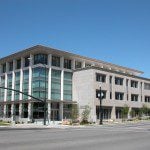
I continue in the spirit of another very recent blog entry:
Arthur Brooks, who served for a number of years as the president of the conservative/libertarian American Enterprise Institute and who is now a professor in the John F. Kennedy School of Government at Harvard University, was the keynote speaker at the recent National Prayer Breakfast. He is a particular hero of mine. I’ve met him, briefly, and I’ve written enthusiastically about his work (e.g., here and here). He’s also, for whatever it’s worth, an outspoken friend of Brigham Young University and, although himself a devout Catholic, of the Church of Jesus Christ of Latter-day Saints.
At the National Prayer Breakfast, now in its 69th year and traditionally nonpartisan, Professor Brooks implored us all, explicitly including himself, to transcend our current culture of contempt and called upon the Christians there and beyond to be genuine disciples of Christ, real Christians, loving our enemies. The text of Dr. Brooks’s remarkable speech is available through the website of the Washington Post, if you’re able to access that. Or, alternatively, you can watch it on C-SPAN. I strongly, strongly, strongly recommend it; it runs only slightly longer than ten minutes.:
https://www.c-span.org/video/?c4853002/user-clip-arthur-brooks-national-prayer-breakfast
At the close of his remarks, he expressed hope that that date, 6 February 2020 — which happened to be the day following the impeached Mr. Trump’s acquittal by the Senate — would be the date on which our national healing could begin.
“Arthur, I don’t know if I agree with you,” said President Donald J. Trump as he opened his own remarks. “I don’t know if Arthur is going to like what I’m going to say.”
“As everybody knows,” he continued a few lines later, “my family, our great country, and your President, have been put through a terrible ordeal by some very dishonest and corrupt people. They have done everything possible to destroy us, and by so doing, very badly hurt our nation. They know what they are doing is wrong.”
A few seconds later, although he didn’t actually name them, he specifically attacked Senator Mitt Romney and Speaker Nancy Pelosi (who was seated on the dais): “I don’t like people who use their faith as justification for doing what they know is wrong. Nor do I like people who say, “I pray for you,” when they know that that’s not so.”
Curious, I watched Arthur Brooks during those comments. He was seated about three or people down, to the president’s left. At first, like everyone else on the dais, he was sitting back, watching Mr. Trump as the president spoke. He was facing to his right, toward the lectern. Then, when Mr. Trump began to denounce “very dishonest and corrupt people,” he turned and, without expression, looked straight forward. He reached for his water and took a drink.
When Mr. Trump declared “I don’t like people who use their faith as justification for doing what they know is wrong. Nor do I like people who say, “I pray for you,” when they know that that’s not so,” Professor Brooks was staring intently down at the table before him.
In closing, I invite you to read this very thoughtful piece by the wonderful evangelical conservative commentator David French:












